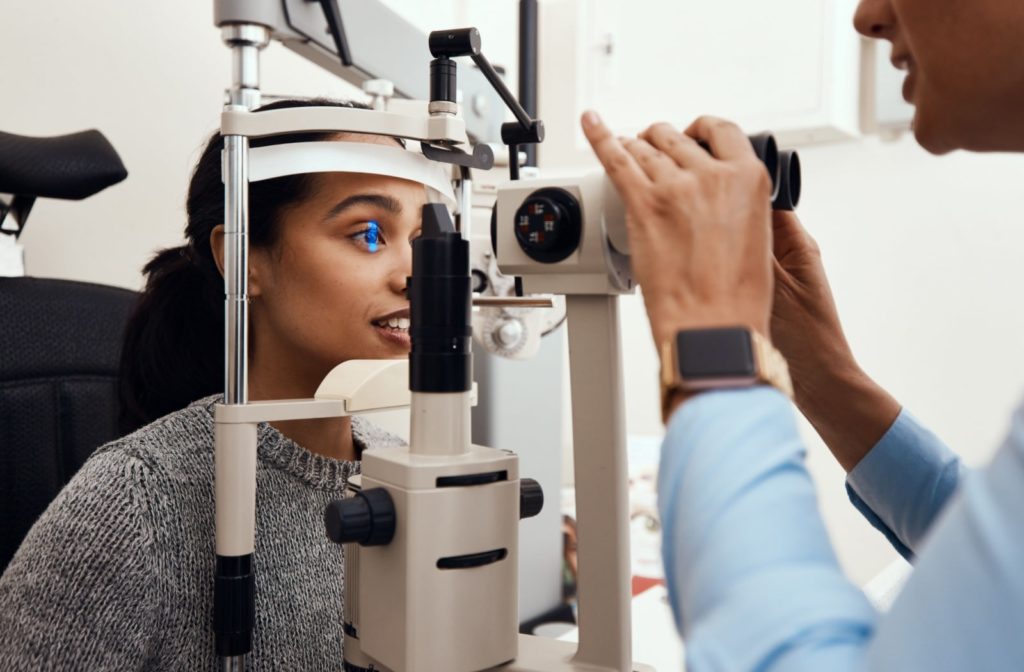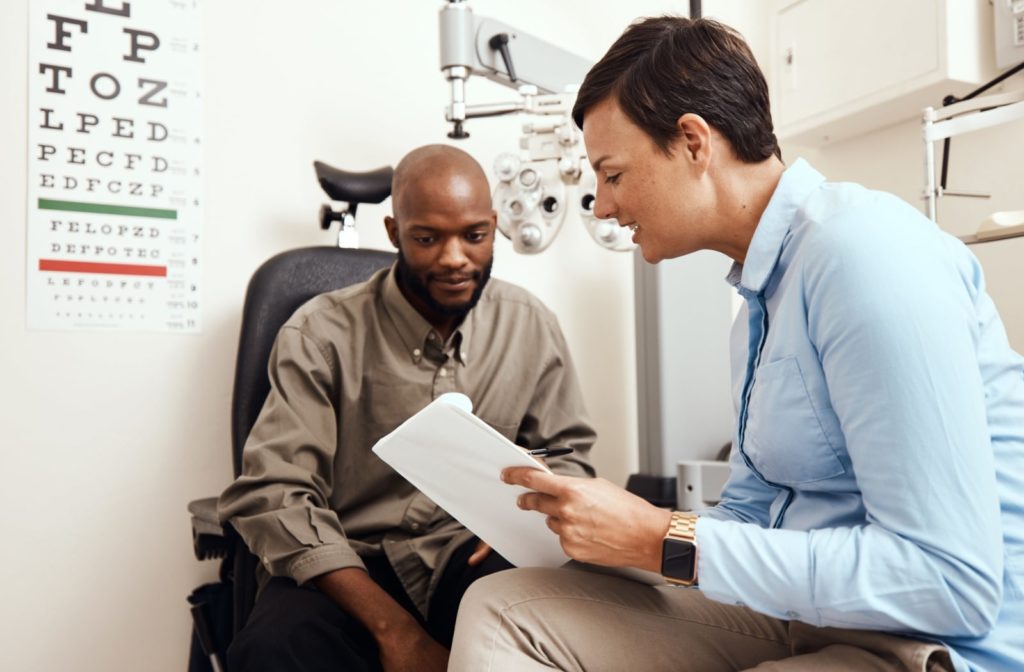Regular eye exams are crucial for maintaining not only good vision but also overall health. They can detect problems early, prevent future complications, and even uncover underlying health issues. With all the benefits eye exams offer, how long do they take? Less time than you may think!
An eye exam typically takes no longer than 90 minutes. This timeframe includes pre-testing, the main examination, and post-exam consultations. However, more complicated exams or additional tests can extend this period.
What to Expect During an Eye Exam
An eye exam typically involves several stages that work together to give a complete picture of your eye health. Here’s a breakdown of what you can expect:
Pre-Testing
Before the main examination, we’ll usually talk about your overall eye health. This is a great time to bring up any concerns you may have. This conversation can go quite fast if you’re returning to your regular optometrist. If it’s your first visit, it’s time to get to know you! We’ll ask you a few questions to help us personalize your exam, such as:
- Medical history
- General health
- Family’s medical history
- Any medications you’re taking
- Whether you wear corrective lenses
This background information is vital in tailoring the exam to your specific needs and helps us know about any potential problems we should be on the lookout for.
The Examination
During the main part of the eye exam, your optometrist will assess many functions of your eyes—inside and out. This is the bulk of the exam and takes up the most time. Depending on your needs, some tests you may undergo include:
- Vision screening: We can check your visual acuity using an eye chart. We’ll ask you to read letters of varying sizes from a specific distance to determine the sharpness of your vision.
- Refraction test: To help determine your prescription for glasses or contact lenses, we can use a phoropter. This device uses a series of lenses to help identify which ones provide the clearest vision.
- Pupillary reactions: We may assess how your pupils respond to light by shining a light into each eye from a retinoscope. This way we can observe the speed and size of pupil constriction, which can help detect any neurological issues.
- Eye health assessment: We have various tools to get a better look at your eye’s external and internal structure. Something like a slit lamp allows us to examine the front structures of your eyes such as the cornea, lens, and iris. We may use dilating eye drops to see the back of your eye, but we’ll let you know if we plan to do that as you’ll need to arrange a ride. This thorough examination helps identify signs of diseases like cataracts or macular degeneration.
- Eye pressure measurement: Glaucoma becomes increasingly important to test for as we age. We use tonometry to measure the pressure inside your eyes—one of the telltale signs for the most common type of glaucoma.
- Eye movement test: Healthy vision is about more than just how well you see, it’s also about how your eyes work together. We can perform an ocular motility test to evaluate how well your eyes track moving objects. This involves following a target in various directions to check for any issues with eye muscles or coordination, and identifying conditions like strabismus.
Post-Exam Consultations
After the examination, we’ll have a chance to discuss the results with you. This can include reviewing any findings and their implications. If you require corrective lenses, treatments, or further testing, we can discuss recommendations or offer solutions. This is another excellent time to ask any questions you may have for your optometrist. We’re here to clear up any doubts and help you feel confident about your situation!

Factors Affecting Exam Duration
Several factors can influence how long your eye exam takes, including:
Type of Tests Required
Complex tests, such as dilating your pupils for a thorough retinal examination, can add significant time to your visit. This process allows us to get a better view of the back of your eye, which is crucial for diagnosing various conditions like retinal detachment, glaucoma, or macular degeneration.
Additional tests like visual field testing or optical coherence tomography (OCT) can also extend the duration of your exam.
Patient History
Your exam may be a bit more comprehensive, and, therefore, longer, if you have a history of eye conditions, such as cataracts, glaucoma, or macular degeneration. The same can be said if you have other health issues like diabetes or hypertension.
A detailed patient history helps us understand your specific needs and tailor the examination accordingly, so no potential issues are overlooked.
Special Considerations
Children and seniors may require additional time for testing and explanations, which can extend the duration of the exam. Pediatric eye exams might include specific tests to assess visual development and eye alignment, while older adults may need screenings for age-related conditions such as cataracts or age-related macular degeneration (AMD).
Tips for a Smooth Exam
To help your eye exam go as smoothly and efficiently as possible, consider these tips:
- Prepare Questions: Write down any concerns or questions you have about your vision or eye health.
- Insurance Information: Bring your insurance card and details to streamline the administrative process.
- Know Your Medical History: Be ready to discuss your personal and family medical history, particularly any eye-related issues.
Book Your Eye Exam in Loveland Today!
We want to make your time with us worthwhile, and an hour or so is a small price to pay for confidence about your eye health! We recommend you visit our dedicated team at 2020 Eyecare Ohio for a check-up at least once a year so we can stay ahead of any potential issues.
Schedule your family’s next eye exam today and enjoy comprehensive care with professional, friendly service. By staying proactive about your eye health, you’re taking an important step towards a clearer, healthier future. We look forward to seeing you soon!



